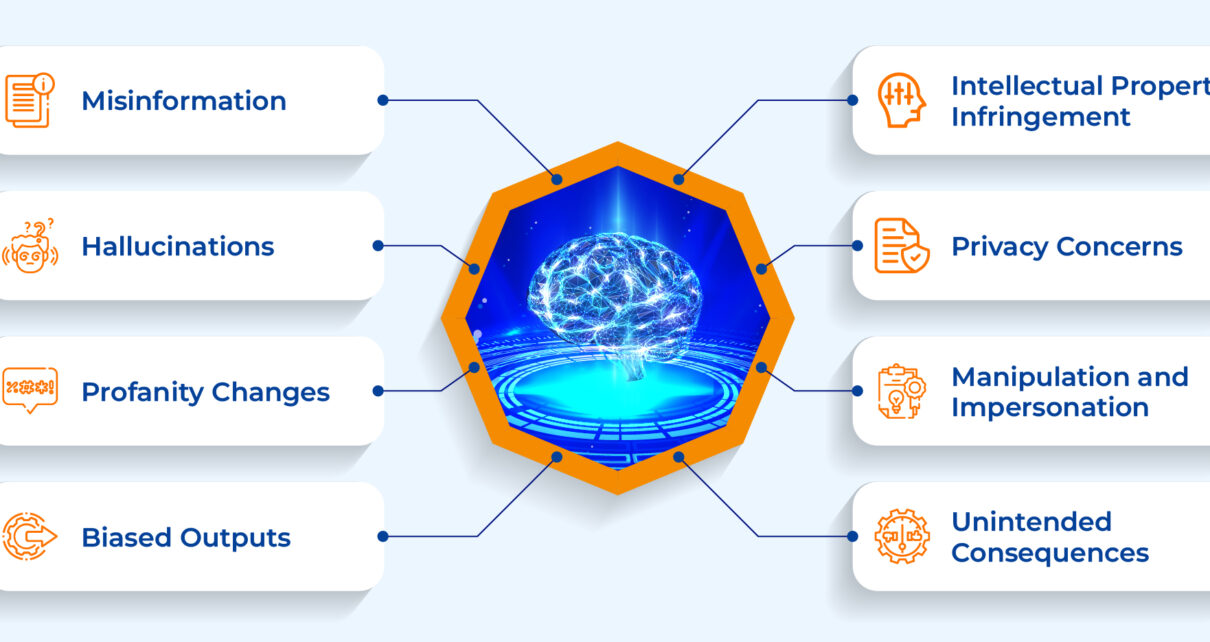As the world is leaning towards the faster adoption of Generative AI fuelling growth and innovation, there are risks associated with the technology adoption, and therefore, calls for having a pragmatic approach to analyze the risks. In addition, concerns about the accuracy and ethical usage of GenAI need in-depth analysis and addressal. Across the world, corporate leaders, policymakers, and technology enthusiasts are viewing the progressive changes that GenAI tools will bring in how businesses are conducted, and customers are served. But they also understand the importance of navigating the challenges and analyzing them to find ways to avert them from empowering the technology to serve businesses and society at large.
Significant Risks Associated with the Usage of Generative AI
In the current digital landscape, the growing popularity and usage of Generative AI are bringing potential security risks, driving automation, and accelerating creativity to the next level. But, the risks are pretty obvious and need a careful thought process. So, let’s get started with the critical risks that are associated with the usage of GenAI.
- Accuracy of GenAI Models: Generative AI uses large language models trained on a vast data pool. But still, when any prompt is generated, or the question needs to be answered, GenAI uses a finite training data pool to understand the query and create responses. Here, the key challenge lies in accurately responding to queries or questions about out-of-sample requirements. Moreover, the information generated by GenAI may be possible but only partially accurate and, with proper verification, can easily mislead the user. Moreover, generative AI doesn’t have a source of truth that can be called “inherent.” Moreover, its capability to understand things is not similar to humans; it only follows the training data to make decisions.
- Data-Privacy Risks: Another critical risk associated with Generative AI is the data security and privacy threats. As the GenAI is trained to create new content, it is highly likely to reproduce the snippets based on the training data. Therefore, if the data sets on which GenAI is trained, the probability is higher for the leakage of sensitive data. Furthermore, leakage threats can lead to security and regulatory violations if the training data is based on critical customer information without anonymization. Another critical challenge that invokes security threats is ascertaining the data rights, as GenAI creates prompt responses without giving any trace of the origin of the data, leading to potential data provenance concerns.
- Bias Risks Associated with Generative AI: As Gen AI is trained on a large volume of data sets, if these data sets are based on certain biases, then the output generated by the Gen AI would also be biased. This approach is quite dangerous for society at large if Gen AI is used for online communities, as the prompts can promote racism or misrepresent the interests of minor communities, can be a fairly significant risk for the overall fabric of the society, and can potentially lead to amplify the biases that are not the reflection of the community.
- Risks Associated with Intellectual Property– Intellectual Property is another facet where Generative AI can prove risky when regulations to IP norms are required. Suppose Generative AI creates any piece of content, art, or music; who will be considered as the IP owner in this scenario- is it the developer who created the Gen AI, the user, or if AI entirely makes it, then there won’t be any copyright issues? The next question lies in addressing licensing issues, as the data set on which the model is based can be regulated on specific parameters, or the final output generated by Gen AI needs to be licensed. There can also be infringement issues due to the striking resemblance to the original copyright piece that GenAI inadvertently creates according to the patterns of copyright material.
- Ethical Risks Associated with Generative AI: The most serious challenge targeting the ethical usage of Gen AI is the rise of deepfakes. Recently, a significant concern has been raised by philanthropic groups regarding the misuse of GenAI to create deepfakes similar to authentic images, voices, and videos of the concerned person. Therefore, paving the way for the questionable usage of GenAI for mass good as deep fakes have the potential to create massive unrest in society by making videos of famous personalities to create potential disruptions.
Conclusion
To sum up, as the benefits of GenAI are real, so are the potential threats of this technology, which calls for stringent measures to use it cautiously. Companies across the globe need to be careful while optimizing their work processes using this technology. Moreover, suppose businesses are interested in leveraging GenAI to streamline their processes. In that case, resorting to the services of an expert IT partner is critical for them to make accurate, ethical, and optimal usage of the technology.




